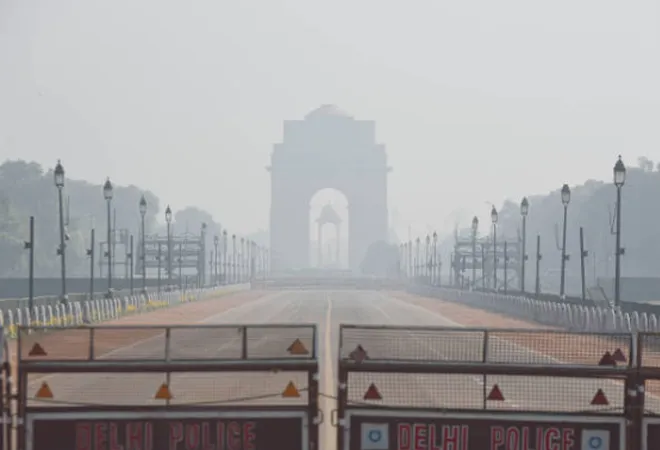
As winter air pollution chokes the northern region of India, and is even spreading to far off states like West Bengal, there is a heated debate over this crisis. Unlike a few years ago, when the hype around air pollution was largely centered around Delhi, the purview has expanded to include states like Haryana, Uttar Pradesh, Punjab, and Rajasthan to a significant extent.
Furthermore, it has been widely acknowledged that the sources of winter air pollution are multiple and its impact is felt by citizens from across states. The meteorological factors including La Niña and anticyclonic conditions developing over eastern parts of the country along with weather conditions of wind patterns, development of fog and mist over Northern India, contribute substantially towards the geographical diversification of the air pollution.
The discourse became more about blame-shifting and the intended objectives of collaborating together seem to have been lost along the way.
Because of this nature of the crisis, a collaborative approach is the need of the hour. Previously, Delhi and the adjoining states have tried to work in a collaborative manner to address this challenge. However, the discourse became more about blame-shifting and the intended objectives of collaborating together seem to have been lost along the way.
This year, to deal with this challenge in a holistic and cooperative manner, the Parliament of India passed the ‘Commission for Air Quality Management in the National Capital Region and Adjoining Areas Bill, 2021’, which created a commission to manage, monitor, and take steps to control the air pollution in the NCR and adjoining areas. This commission, commonly known as the Air Pollution Commission, has since then recommended various strict actions such as ban on construction activities, etc., to curb the air pollution at its source.
In the past few years, the legislature, executive, and judiciary have been tackling this issue head-on and have been trying to figure out concrete ways to mitigate the hazardous impacts of the toxic winter air pollution. Similarly, the Supreme Court is hearing this matter currently and is instructing all the state governments to follow certain steps for curbing air pollution. Interestingly, the apex court has also instructed to set up an Enforcement Task Force, which will step in if the states fail to comply with the directions given by the Air Pollution Commission.
In the past few years, the legislature, executive, and judiciary have been tackling this issue head-on and have been trying to figure out concrete ways to mitigate the hazardous impacts of the toxic winter air pollution.
These developments point towards an insightful learning. There is a classical situation, where a substantial amount of the time and resources of judiciary, executive, administrative committees and the legislature are not yielding the envisaged outcomes on the ground. This situation can be attributed to the behavioral development in which authorities, including the judiciary, are looking for immediate fixes to a problem that is complex and long-standing in nature. For instance, the ban on construction activities, or the recent Supreme Court instruction to the Union and State governments to submit proposals for shifting industrial units to Piped Natural Gas (PNG) or other cleaner fuels can have compounded adverse impacts on various stakeholders, whose concerns might not have been properly understood while delivering such instructions.
A way forward The best possible way to account for all the complexities related to the cause, effect, and impact of air pollution is through state-wide strategic collaboration. This can be achieved through imbibing the spirit of cooperative federalism along with having a strong leadership to drive forward the policies and actions.
A multi-stakeholder regional cooperation forum, which intends to build on the work already done by various expert groups and authorities to develop concrete regulatory, technology-based, and governance solutions, with a built-in accountability mechanism for effective implementation, monitoring, and feedback, is the way forward. Such a regional cooperation forum should have representation from academia, pollution control boards, state bureaucracy, local administration, health experts, industrial stakeholders, worker associations, environmental activists, climate experts, economists, enforcement agencies, amongst others. This is indispensable to decoding the extremely complicated linkages in the causes behind the air pollution and the unintended consequences that quick-fix solutions might have.
The best possible way to account for all the complexities related to the cause, effect, and impact of air pollution is through state-wide strategic collaboration.
The state of Uttar Pradesh, with its wide geographical, administrative, and political capital, can provide the pivotal leadership required to effectively foster a framework < style="text-decoration: line-through">of for cooperative federalism and drive the intended change on the ground.
This is important given that the Air Quality Index for cities other than Delhi have been recording even worse levels of air quality than Delhi. In the past few months, cities in Uttar Pradesh including Sitapur, Meerut, Muzzafarnagar, Noida, Bulandashahar, amongst others in Uttar Pradesh have recorded AQI over and above 350, which is considered as very unhealthy. On several occasions, the AQI levels in these cities breached the level of 400, which is considered to be ‘hazardous’. Similarly, various other cities across the other states have recorded high levels of pollution as well.
The objective is not to add another authority while there are existing bodies, task forces, and commissions that deal with the issue of air pollution. The objective is to consolidate the energies and resources of all such authorities, across the states that are involved, and provide holistic, action-based solutions to deal with the problem.
The forum can follow a simple, functional framework to devise solutions. It can pool the knowledge and experience of different stakeholders from across the states for identifying the best practices regarding air pollution monitoring, following which, the forum can also help in delve into identifying region-specific localised causes and effects of the air pollution problem. On the basis of these causes and effects, the forum can then provide an overarching framework for devising action-based solutions under different circumstances. The forum can also convene capacity building workshops < style="text-decoration: line-through">of for local enforcement agencies and monitoring agencies.
While the prominent causes of pollution are similar across states such as industrial pollution, vehicular pollution, stubble burning, construction-based pollution, amongst others, all these cities also have localised conditions and realities which require customised solutions to deal with them.
While the prominent causes of pollution are similar across states such as industrial pollution, vehicular pollution, stubble burning, construction-based pollution, amongst others, all these cities also have localised conditions and realities which require customised solutions to deal with them. One-size-fits-all approach cannot work effectively. Therefore, the Regional Cooperation Forum, while providing overarching framework for action, should have representation from the local and city-level administration to catalyse effective implementation.
Therefore, the spirit of cooperative federalism can enable the states to devise workable solutions to mitigate the problem of air pollution. At the same time, the strong leadership of Uttar Pradesh can provide inputs on ways and means to implement those solutions in an effective manner, by being a state that leads by example.
The views expressed above belong to the author(s). ORF research and analyses now available on Telegram! Click here to access our curated content — blogs, longforms and interviews.




 PREV
PREV


